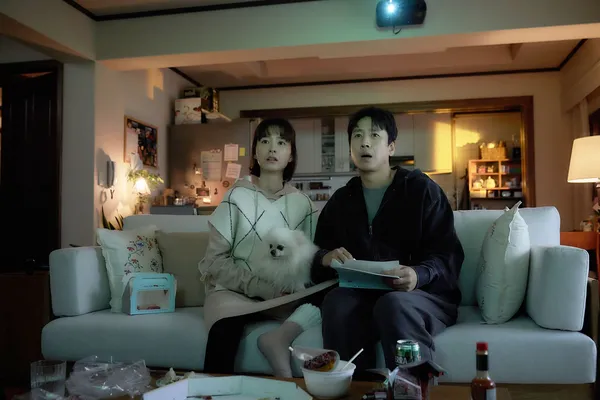 |
| Sleep |
Loving couple Hyun-su (Lee Sun-kyun) and Soo-jin (Jung Yu-mi) find their lives turned upside down when the former begins sleepwalking – and not just that, but engaging in unconscious behaviour which could be very dangerous to himself or others. Questions of identity and belief come to the fore in Jason Yu’s Sleep, a film which straddles the lines between horror and romance whilst presenting a complex portrait of two people in crisis, trying to hold on to what they’ve built together despite being beset by anxieties and doubts. Now ready for release in US cinemas, it’s a film that has enjoyed rave reviews around the world, with Parasite director Bong Joon-ho calling it “the most unique horror film and the smartest début film I've seen in 10 years.”
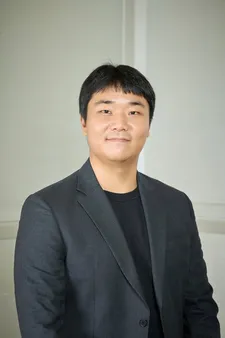 |
| Jason Yu Photo: courtesy of Magnet Releasing |
In the run-up to release, I had the chance to chat to Jason, who began by explaining the film’s origins.
“I think there's two factors going into it,” he said. “First was just the sheer shock and terror I felt when I read about stories of sleepwalking patients. You know, the drastic, the macabre stories of people jumping off of buildings or driving while they're sleeping or harming their loved ones. I remember feeling very shocked by when I read those stories, and it had me wondering what the everyday lives of these sleepwalking patients might look like. But what made me more curious was the everyday lives of the people around them, their loved ones who had to be with them 24/7. I couldn't wrap my head around what their everyday might look like. That fascinated me.
“I wanted to research and delve further into the story. I thought there might be something there as a horror film. And also, I do have a couple of nasty sleeping habits myself. I'm a very bad, loud snorer. But what really terrifies my wife is me forgetting to breathe while I sleep. That's when she wakes up and she's terrified by the fact that I might not be able to breathe again. So even when I do eventually regain my breathing, she's unable to sleep from then on. There are many times when she was just up all night because of how frightened she was of me stopping breathing for those minutes.
“Although I was very guilty about that and I felt sorry for another side of me, I was very fascinated about it. And I guess the filmmaker in me or the storyteller in me gradually imagined what would happen if my sleeping habits were a bit more severe, a bit more terrifying. You know, what if it did inflict harm on others? Imagining those scenarios also led me to be interested in the prospect of sleepwalking as a horror film.”
We talk about the romance at the centre of the story.
“I think that was crucial in developing the story because before I found that nugget, I wasn't really passionate about this project,” he says. “Before it was just a repetition of the husband's character showing those nasty symptoms, sleepwalking, the wife being terrified the next night, even scarier symptoms, and the wife being even more terrified. I thought it was a bit too repetitive and gimmicky. It was only when I found out that the story could be much more that that changed.
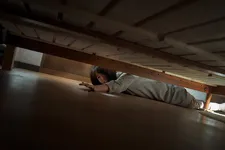 |
| Sleep |
“A lot of personal elements seeped into the story. At the time that I was writing the screenplay, I was preparing to marry my longtime girlfriend, now wife, and I think because of that, I was thinking a lot about marriage and what an ideal marriage would be. I think those sorts of thoughts and themes found their way into the film, and those were the things I really latched on to. Bringing that element into the story really made me care for the characters, care for the story, and made me finish the project, flesh out what the story could be, and had me excited about it.”
Lee and Jung have played a couple in a number of films beforehand. Did they bring something personal to that as well?
“Yes, absolutely. As professional veteran actors, they brought their A game acting to it, obviously, and also just themselves developing what the characters would be or what their relationship would look like. They did a lot of homework on that, especially Lee Sun-kyun, the husband character. I think his modus operandi is to be over-prepared for his role, to personify his character. I'm not sure if that's the right word, but to wear his character before he comes on set.
“We did discuss a lot about what these characters were like, their backstories, but also, as you mentioned, they did share a lot of screen time together in previous films, although not necessarily commercial films. They did have four movies under their belts where they played romantic interests. I didn't really think that this would help me out, but obviously, in hindsight, it did, incredibly, because you know how they say what's really difficult to direct are not the fiery, fighting, conflict scenes? It's those little scenes where you have to convey the minute chemistry, the bonds, the love of everyday life that a married couple have. I think this is something that can't be achieved merely through acting powers. You really have to have this sort of bond with each other. So I actually remember saying to them, ‘We should have a couple of outings and go get some ice cream or something, go stroll in the park,’ just to have them share this time and create this bond. But they cut me right off. It was not necessary at all.
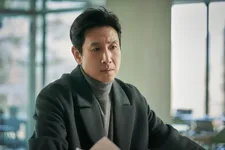 |
| Lee Sun-kyun in Sleep Photo: courtesy of Magnet Releasing |
“It was not necessary at all because they did have these four films under their belts, and also they were immensely great friends. They already had this great chemistry and bond when they came to set. I really took advantage of that. I was very happy that they had that.”
Talking about acting techniques, it’s interesting that Hyun-su is an actor, because, there are distinct similarities between the experience of acting and trying on different personalities, and the idea of someone being possessed or turning into a different person when asleep.
“I think that element wasn't why I made him to an actor necessarily, but because he was an actor, I thought I had opportunity to delve into those things and flesh out those things. The reason I made him an actor was, I think, on a more personal level. Unbeknownst to me, only after I created I completed the screenplay, I realised that the husband and wife characters resembled myself and my wife at that time. Just like Hyun-su didn't have a lot going for him – he's an aspiring actor who may have been in the game for too long, maybe overstayed his welcome – I was kind of like that as well. I was an aspiring director at that time who was unemployed. I had nothing going for myself.
“I thought there were a lot of parallels in that. And I think on a subconscious level, that's why I probably created him as a aspiring or an unfamous actor. On the other hand, my wife resembles Soo-jin a lot. She's very supportive of my unfruitful endeavours, and whenever I try to veer away from my dream, she's the one who says ‘That's nonsense, you got this.’ I think our relationship and sensibilities is what dictated the relationship of Hyun-su and Soo-jin, and also their jobs. Su-jin is quite well off financially and socially, and that was the same for my wife. She was always much better than me in both aspects, even now and especially then.”
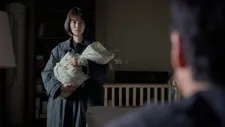 |
| Sleep |
I point out that he’s had an incredible reaction to this film. Did he expect that? How does he feel about it?
“It was a great surprise. I didn't expect it at all, to be honest. I think the curse of creating a film and watching it over and over again, especially during the editing phase, is that all you can see are the blemishes and the regret, and your dread is that everybody else will see it. It comes to a point where you feel like there's no redeeming qualities about the film. So I was actually dreading the première and dreading the opening of the film in Korea and other countries. But the good thing about that is when it did well and when it was well received overall, the joy I felt was even bigger. The surprise, the breath of fresh air I felt was very immense.
“I'm very grateful just for being able to create this film. Casting these great actors, getting it financed, made, completing it and having it released is, I think, like winning five consecutive lotteries. Being able to recoup the investment as well as having it well received in Korea and in other countries, it's just a cherry on top. What more can I ask? I think it's a miracle.”
Sleep is very much a film of two halves, with a distinct shift of perspective in the middle. Was he able to shoot it in two separate blocks?
“Because we shot it on a set, we did have the fortune of shooting it consecutively, so we were able to divide it,” he says. “It was also because were constrained in the budget. We had no other choice but to shoot it consecutively because for each chapter, the setting of the house differs quite a lot, and we didn't have money to flip flop around. So each time we completed a chapter, we had to make sure that we had everything before we could move on to the next. We couldn't go back and get pick-up shots.”
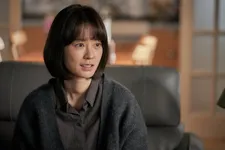 |
| Jung Yu-mi in Sleep |
I note that a lot of directors, certainly on first features, want to show off everything they can do and use a lot of fancy shots. He keeps it simple, which enhances the sense of intimacy with the characters. The camera stays quite close to them. Was that an artistic decision or was it influenced by the limited budget and opportunities?
“I think it's a bit of everything. Just the nature of the project and the story, where it's located in this bland, square box of a house, I think there wasn't much room for fantasy shots. Also because of that, the priority for the cinematographer and I was to keep it so that we could follow and enhance every shot. Every shot has to precisely pinpoint the psychology of each character and their relationship. If there's even a slight shift of emotions or a change in their relationship, we shot it in a way that would enhance that.
“That was the main goal. In a lot of horror films, they have a lot of stylish shots and it really supplements the horror of the film, but in this case we were trying to go with this sort of realism, and because of the constraints that we had, we concluded that the best way was to not be too show-offy. Instead, just focus on the emotions and the shift in emotions and just make every beat count.”
No longer able to think of himself as a failed director, he’s now looking to the future.
“I have a couple of projects in mind. Two, actually, that I'm very passionate about. One is a similar horror film, in the vein of Sleep but slightly bigger in scale. The other is in the complete opposite spectrum. I guess I could preface this by saying my favourite genre as a film spectator is romantic comedy. I do also have a romantic comedy project that I'm very excited about. Hopefully it gets made at some point in time.”





















